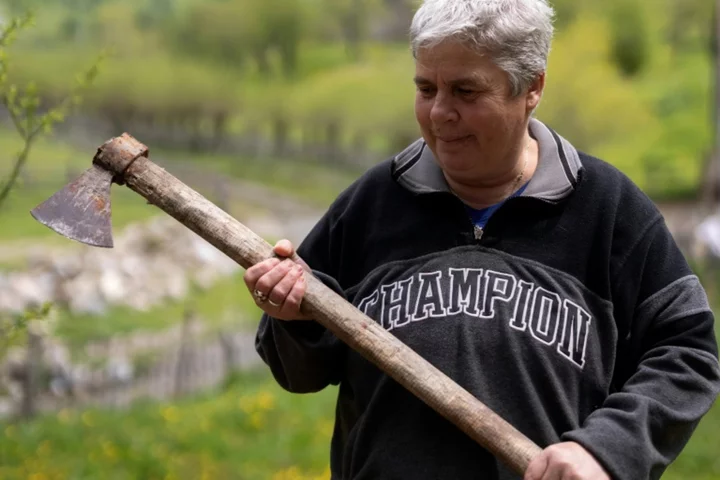For decades, Gjystina Grishaj chopped wood, drove tractors and tended livestock as the man of the house in a remote valley in northern Albania, only to find herself alone after years of sacrifice supporting her family.
Grishaj is among the last of Albania's so-called "sworn virgins" -- an ancient, gender-bending tradition that saw her renounce sex, married life and parenthood in exchange for the right to live and work as a man in the deeply patriarchal society.
The choice -- made over 30 years ago -- was simple. With her father sick and eldest brother dead, she embraced the "burreneshe" identity -- as it is known in Albania -- which allowed her to provide for her family.
But now at 58, Grishaj is alone after her relatives, like hundreds of thousands of other Albanians, emigrated in search of a better life -- leaving her behind in their family home.
"After all the sacrifices I've made for my family, it's the loneliness that weighs on me," Grishaj told AFP.
"There have always been a lot of us living in this big house, which is now plunged into silence. I'm overwhelmed with grief."
- 'I would hide' -
Grishaj came of age during the hard years of communist rule and the chaotic aftermath that followed Albania's entry into the global economy.
To add to their woes, Grishaj's family struggled to make ends meet living in an isolated valley along Albania's craggy, northern frontier -- where winters are harsh and traditions run deep.
With six mouths to feed, her sister married off, eldest brother dead, and her father stricken with disease, Grishaj decided to make the ultimate sacrifice.
"I decided to work like a man to help with my siblings' education and my father's medicine," said Grisha.
Her mother, however, pushed back "insisting a lot that I get married," she added. But "when people came to ask for my hand in marriage, I would hide."
Over the years, Grishaj hardened up physically as she helped the family scratch out a living doing manual labour.
"I became the mainstay," she said.
But life as a burreneshe came with its advantages.
Being a sworn virgin enabled her to escape arranged marriages without disgracing her family.
She wore her hair short and pants long and was able to drink brandy in the cafes with the men and have a say in major decisions in the home.
In the village, where barely 20 people live year-round, she became affectionately known by her nickname Duni.
Her choice to forsake womanhood for a life of hard labour has earned her "respect" in the eyes of the community, said Paulin Nilaj, the owner of a nearby guest house in Lepushe.
"She has adopted the habits of men to have a special status," he adds. "I've always known her like that, so if one day she got married, that's when I'd be surprised."
- 'Pillar of the family' -
The role is a familiar one for Albania's sworn virgins.
"It was a very appreciated and honoured choice," anthropologist Aferdita Onuzi told AFP.
"These women who decided to be the pillar of the family, to rub shoulders with men in the hardest tasks, enjoyed the respect of all, such a choice is considered the supreme sacrifice."
There is no official figure regarding the number of burrenesha remaining in the Balkan nation of 2.8 million. Most experts suspect there are no more than a handful left as Albania embraces modernity.
"Maybe with me the chapter will be closed, no one will become a burreneshe anymore. Because today life is different, there's no such pressure. Those who want to work can do so anywhere," said Grishaj.
In any case, experts agree that the choice has little to do with sexual identity.
"Sexual relations were not even a subject," insisted Elsa Ballauri, a rights activist and curator of a museum in Tirana dedicated to the history of Albanian women.
The phenomenon is "the result of social circumstances that force someone to impose themselves in a society of men," Ballauri added.
Grishaj shuns any notion that her decision was linked to sexuality, saying "not even God should hear such talk".
And despite the fixation for some in the West with gender-appropriate pronouns, Grishaj said "she doesn't care" about her grammatical place in the world.
"It doesn't matter, it's my life," she shrugged.
And that life has been made all the more difficult now that her family has moved abroad.
After a lifetime of embracing jobs outside of the home, Grishaj has been forced to learn the domestic chores she long shirked, like cooking and cleaning.
Despite a lifetime of hard labour, Grishaj said she has been left with little.
To support herself, she makes herbal remedies concocted from wildflowers and roots foraged in the mountains along with fruit brandy that she sells to tourists.
Even still, Grishaj refuses to ask her siblings or 12 nephews and nieces for help.
"It's difficult for them too," Grishaj said. "They are Albanian immigrants."
Bme-ev/ds/fg

